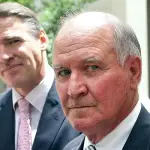
In most instances, an election will produce a parliament where one party – or a coalition of parties – will hold an absolute majority in the lower house. This majority then allows it to form the government of the day, to control the executive government and appoint ministers. In the Federal Parliament, the House of Representatives has 150 seats, so the party or party coalition with 76 or more seats forms the government of the day. Hung parliaments describe a situation in Westminster political systems, where no single party or party coalition holds an absolute majority in the lower house. This creates a situation where there is uncertainty about which party will form a government. In a ‘hung parliament’, the vote of the cross-benches – that is, independent and minor party MPs – becomes crucial. These MPs are said to hold the balance of power because their vote decides who forms the government.
The days or weeks following the election of a ‘hung parliament’ often produces confusion, followed by frantic negotiations, as major parties negotiate with cross-bench MPs to try to win their support. Eventually, cross-bench MPs will form some kind of voting bloc or agreement with one of the major parties. This agreement will allow the formation of a government. The government that emerges from this process is called a minority government because it rules without a majority in its own right. Though not common, there have been several examples of ‘hung parliaments’ in Australian politics:
2010 Federal Parliament. The current Federal government emerged from a ‘hung parliament’, the result of the August 2010 Federal election. The incumbent Labor Party won 72 seats and the Liberal Party-led coalition 73 seats – both short of the 76 seats needed to form a government in their own right. Cross-bench seats were held by four independent MPs (Bob Katter, Rob Oakeshotte, Tony Windsor and Andrew Wilkie) and Greens MP Adam Bandt. After almost two weeks of negotiation, all except for Katter committed to supporting the Labor Party, allowing Labor leader Julia Gillard to form a government.
1999 Victorian State parliament. Needing a 45-seat majority to form a government, both the incumbent Kennett Liberal-National coalition (43 seats) and the ALP (42 seats) fell short. The formation of government hinged on three independent MPs from country regions: Russell Savage, Craig Ingram and Susan Davies. After negotiation, all three backed the ALP, which formed a government under new premier Steve Bracks.
1940 Federal Parliament. Two coalitions – one led by the Labor Party, the other by the conservative United Australia Party (UAP) – both won 36 seats, needing 38 for a majority. The vote of two Victorian independent MPs became crucial; they eventually agreed to back the UAP, allowing Robert Menzies to become prime minister. A year later, both independents switched their vote to the ALP, resulting in a change of government and a new prime minister (John Curtin).
Minority governments are an unusual but interesting political phenomenon. Some points to note about minority governments include:
Weakness. Though not always the case, minority governments may find themselves in a difficult political situation. They may be unable to pass much legislation or take decisive action. During periods of minority government, the opposition may become increasingly aggressive, in the hope of forcing the minority government to a new election.
Instability. Because minority governments often cling to power by just one or two seats, any change in the composition of the parliament may also change the government. An example of this is if a sitting MP dies or resigns, and the consequent by-election returns a candidate from another party.
Negotiation. Hung parliaments and minority governments can force parliament to alter the way it does business, particularly with regard to develops and passes legislation. The legislative process may become more conciliatory and involve more negotiation between major parties and cross-bench MPs.
Significance of crossbench MPs or minor parties. A hung parliament allows cross bench MPs or minor parties to decide the government of the day. In doing this they can exert undue influence, such as advancing their own policy agendas or the interests of their electorate. Some consider this unfair, undemocratic and inappropriate, a case of the ‘tail wagging the dog’.
© lawgovpol.com 2014. Content on this page may not be republished or distributed without permission. For more information please refer to our Terms of Use.

